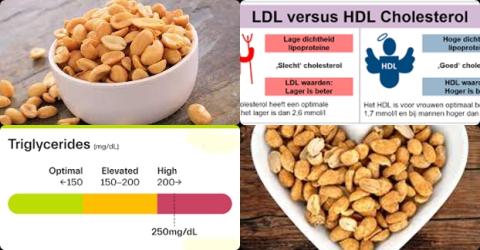
Objectives:
Although numerous studies have reported the protective effect of nut consumption on cardiovascular risk, evidence for the role of peanuts in maintaining cardiometabolic health is inconclusive. Therefore, this meta-analysis (review article) has been conducted.
Does a high consumption of peanuts improve causally cardiovascular risk factors, such as cholesterol levels and LDL/HDL ratio?
Study design:
This review article included 10 RCTs (8 parallel RCTs and 3 crossover RCTs) with a total of 643 participants (316 males and 327 females) aged between 18 and 84 years from Asia, North America, Europa, South America and Australia.
The administered doses of peanuts ranged between 25 and 200 g/d, with follow-up periods of 2-24 weeks.
The strength of evidence varied from very low to moderate, depending on the outcomes.
Results and conclusions:
The investigators found meta-analysis of clinical trials revealed that peanut consumption was significantly associated with a decrease in triglycerides levels compared to the control interventions [MD = -0.13, 95% CI = -0.20 to -0.07, p 0.0001].
This significant reduction was most acute in healthy subjects [MD = -0.13, 95% CI = -0.25 to -0.00, p = 0.04] and in those who consumed peanuts or peanut butter [MD = -0.14, 95% CI = -0.20 to -0.07, p 0.0001].
The investigators found meta-analysis of clinical trials revealed that peanut consumption signicantly lowered total cholesterol levels among healthy consumers [MD = -0.40, 95% CI = -0.71 to -0.09, p = 0.01].
The investigators found meta-analysis of clinical trials revealed that peanut consumption signicantly lowered total cholesterol levels among healthy consumers [MD = -0.40, 95% CI = -0.71 to -0.09, p = 0.01].
The investigators found meta-analysis of clinical trials revealed that peanut consumption resulted in a signicantly lower LDL-cholesterol/HDL-cholesterol ratio among healthy consumers [MD = -0.19, 95% CI = -0.36 to -0.01, p = 0.03].
The investigators found, however, individuals at high cardiometabolic risk experienced a significant increase in body weight after the peanut interventions [MD = 0.97, 95% CI = 0.54 to 1.41, p 0.0001], although not in body fat or body mass index.
The investigators found, according to the dose-response analyses, body weight increased slightly with higher doses of peanuts.
The investigators concluded that consumption of 25-200 g/d peanuts during 2-24 weeks may causally reduce triglycerides and total cholesterol levels. May reduce because the strength of evidence varied from very low to moderate. To gain more knowledge about the effects of peanut products on cardiometabolic risk factors, more carefully designed studies in larger populations are needed.
Original title:
Effect of Peanut Consumption on Cardiovascular Risk Factors: A Randomized Clinical Trial and Meta-Analysis by Parilli-Moser I, Hurtado-Barroso S, […], Lamuela-Raventós RM.
Link:
https://www.ncbi.nlm.nih.gov/pmc/articles/PMC9011914/
Additional information of El Mondo:
Find more information/studies on nuts consumption, cholesterol and cardiovascular disease right here.